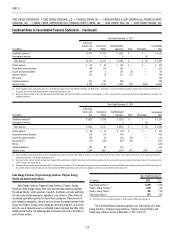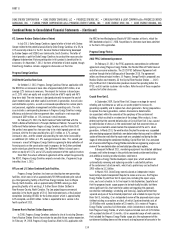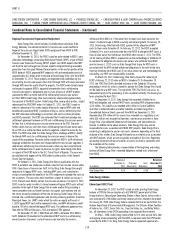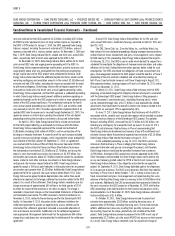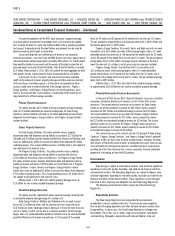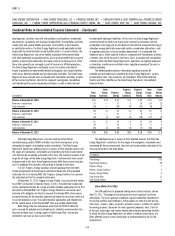Duke Energy 2012 Annual Report Download - page 158
Download and view the complete annual report
Please find page 158 of the 2012 Duke Energy annual report below. You can navigate through the pages in the report by either clicking on the pages listed below, or by using the keyword search tool below to find specific information within the annual report.
138
PART II
Combined Notes to Consolidated Financial Statements – (Continued)
DUKE ENERGY CORPORATION • DUKE ENERGY CAROLINAS, LLC • PROGRESS ENERGY, INC. • CAROLINA POWER & LIGHT COMPANY d/b/a PROGRESS ENERGY
CAROLINAS, INC. • FLORIDA POWER CORPORATION d/b/a PROGRESS ENERY FLORIDA, INC. • DUKE ENERGY OHIO, INC. • DUKE ENERGY INDIANA, INC.
Regional Transmission Organization Realignment.
Duke Energy Ohio, which includes its wholly owned subsidiary Duke
Energy Kentucky, transferred control of its transmission assets to effect a
Regional Transmission Organization (RTO) realignment from MISO to PJM,
effective December 31, 2011.
On December 16, 2010, the FERC issued an order related to MISO’s cost
allocation methodology surrounding Multi-Value Projects (MVP), a type of MISO
Transmission Expansion Planning (MTEP) project cost. MISO expects that MVP
will fund the costs of large transmission projects designed to bring renewable
generation from the upper Midwest to load centers in the eastern portion of the
MISO footprint. MISO approved MVP proposals with estimated project costs of
approximately $5.2 billion prior to the date of Duke Energy Ohio’s exit from MISO
on December 31, 2011. These projects are expected to be undertaken by the
constructing transmission owners from 2012 through 2020 with costs recovered
through MISO over the useful life of the projects. The FERC order did not clearly
and expressly approve MISO’s apparent interpretation that a withdrawing
transmission owner is obligated to pay its share of costs of all MVP projects
approved by MISO up to the date of the withdrawing transmission owners’
exit from MISO. Duke Energy Ohio has historically represented approximately
fi ve-percent of the MISO system. Duke Energy Ohio, among other parties, sought
rehearing of the FERC MVP order. On October 21, 2011, the FERC issued an
order on rehearing in this matter largely affi rming its original MVP order and
conditionally accepting MISO’s compliance fi ling as well as determining that
the MVP allocation methodology is consistent with cost causation principles
and FERC precedent. The FERC also reiterated that it would not prejudge any
settlement agreement between an RTO and a withdrawing transmission owner
for fees that a withdrawing transmission owner owes to the RTO. The order
further states that any such fees that a withdrawing transmission owner owes
to an RTO are a matter for those parties to negotiate, subject to review by the
FERC. The FERC also ruled that Duke Energy Ohio’s challenge of MISO’s ability
to allocate MVP costs to a withdrawing transmission owner is beyond the
scope of the proceeding. The order further stated that MISO’s tariff withdrawal
language establishes that once cost responsibility for transmission upgrades is
determined, withdrawing transmission owners retain any costs incurred prior
to the withdrawal date. In order to preserve its rights, Duke Energy Ohio fi led
an appeal of the FERC order in the D.C. Circuit Court of Appeals. The case was
consolidated with appeals of the FERC order by other parties in the Seventh
Circuit Court of Appeals.
On October 14, 2011, Duke Energy Ohio fi led an application with the
FERC to establish new wholesale customer rates for transmission service under
PJM’s Open Access Transmission Tariff. In this fi ling, Duke Energy Ohio sought
recovery of its legacy MTEP costs, including MVP costs, and submitted an
analysis showing that the benefi ts of the RTO realignment outweigh the costs to
the customers. The new rates went into effect, subject to refund, on January 1,
2012. Protests were fi led by certain transmission customers. On April 24, 2012,
FERC issued an order in which it, denied recovery of legacy MTEP costs without
prejudice to the right of Duke Energy Ohio to make another fi ling including a
more comprehensive cost-benefi t analysis to support such recovery and set
the return on equity component of the rate for hearing. Duke Energy Ohio has
entered into a settlement agreement with the only remaining protester, American
Municipal Power, Inc. (AMP) under which the return on equity will be set at
11.38% legacy MTEP costs will be recovered in rates, and AMP will receive a credit
equal to 75% of its share of the legacy MTEP costs. The settlement agreement was
fi led with the FERC on February 4, 2012 and requires FERC approval.
On December 29, 2011, MISO fi led with FERC a Schedule 39 to MISO’s
tariff. Schedule 39 provides for the allocation of MVP costs to a withdrawing
owner based on the owner’s actual transmission load after the owner’s
withdrawal from MISO, or, if the owner fails to report such load, based on the
owner’s historical usage in MISO assuming annual load growth. On January 19,
2012, Duke Energy Ohio fi led with FERC a protest of the allocation of MVP
costs to them under Schedule 39. On February 27, 2012, the FERC accepted
Schedule 39 as a just and reasonable basis for MISO to charge for MVP costs, a
transmission owner that withdraws from MISO after January 1, 2012. The FERC
set for hearing whether MISO’s proposal to use the methodology in Schedule 39
to calculate the obligation of transmission owners who withdrew from MISO
prior to January 1, 2012 (such as Duke Energy Ohio) to pay for MVP costs is
consistent with the MVP-related withdrawal obligations in the tariff at the time
that they withdrew from MISO, and, if not, what amount of, and methodology for
calculating, any MVP cost responsibility should be.
On March 28, 2012, Duke Energy Ohio fi led a request for rehearing of
FERC’s February 27, 2012 order on MISO’s Schedule 39. On December 19,
2012, the FERC Trial Staff submitted testimony in the Schedule 39 hearing
proceeding in which its witness stated his opinion that Duke Energy Ohio should
not be liable for any MVP costs. The role of the FERC Trial Staff is to act as an
independent party in the proceeding; it has no judicial authority. The hearing has
been scheduled for April 2013.
On December 31, 2011, Duke Energy Ohio recorded a liability for its
MISO exit obligation and share of MTEP costs, excluding MVP, of approximately
$110 million. This liability was recorded within Other in Current liabilities
and Other in Deferred credits and other liabilities on Duke Energy Ohio’s
Consolidated Balance Sheets upon exit from MISO on December 31, 2011.
Approximately $74 million of this amount was recorded as a regulatory asset
while $36 million was recorded to Operation, maintenance and other in Duke
Energy Ohio’s Consolidated Statements of Operations and Comprehensive
Income. In addition to the above amounts, Duke Energy Ohio may also be
responsible for costs associated with MISO MVP projects. Duke Energy Ohio is
contesting its obligation to pay for such costs. However, depending on the fi nal
outcome of this matter, Duke Energy Ohio could incur material costs associated
with MVP projects, which are not reasonably estimable at this time. Regulatory
accounting treatment will be pursued for any costs incurred in connection with
the resolution of this matter.
The following table provides a reconciliation of the beginning and ending
balance of Duke Energy Ohio’s recorded obligations related to its withdrawal
from MISO.
(in millions)
Balance at
December 31,
2011
Provision/
Adjustments
Cash
Reductions
Balance at
December 31,
2012
Duke Energy Ohio $110 $5 $(18) $ 97
Duke Energy Indiana
Edwardsport IGCC Plant.
On November 20, 2007, the IURC issued an order granting Duke Energy
Indiana a CPCN for the construction of a 618 MW IGCC power plant at Duke
Energy Indiana’s Edwardsport Generating Station in Knox County, Indiana with a
cost estimate of $1.985 billion and timely recovery of costs related to the project.
On January 25, 2008, Duke Energy Indiana received the fi nal air permit from the
Indiana Department of Environmental Management. The Citizens Action Coalition
of Indiana, Inc. (CAC), Sierra Club, Inc., Save the Valley, Inc., and Valley Watch,
Inc., all intervenors in the CPCN proceeding, have appealed the air permit.
On May 1, 2008, Duke Energy Indiana fi led its fi rst semi-annual IGCC rider
and ongoing review proceeding with the IURC as required under the CPCN order
issued by the IURC. In its fi ling, Duke Energy Indiana requested approval of a


